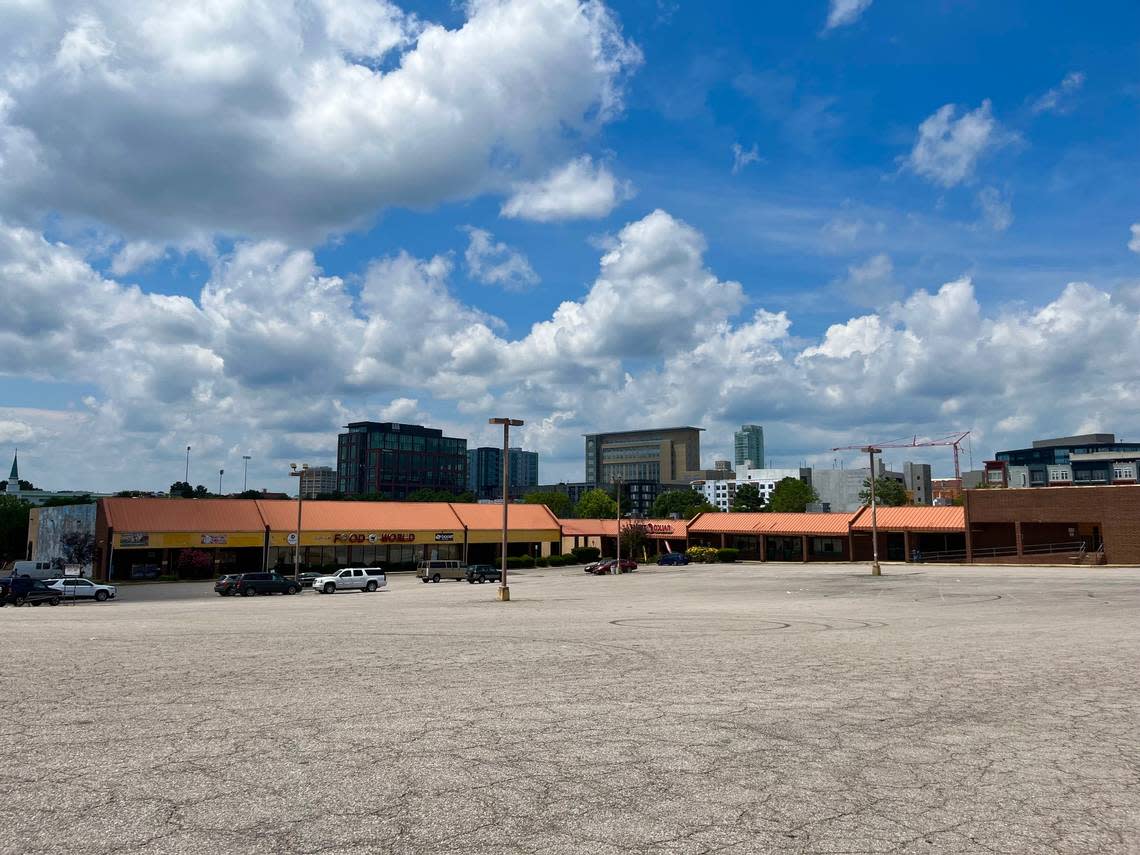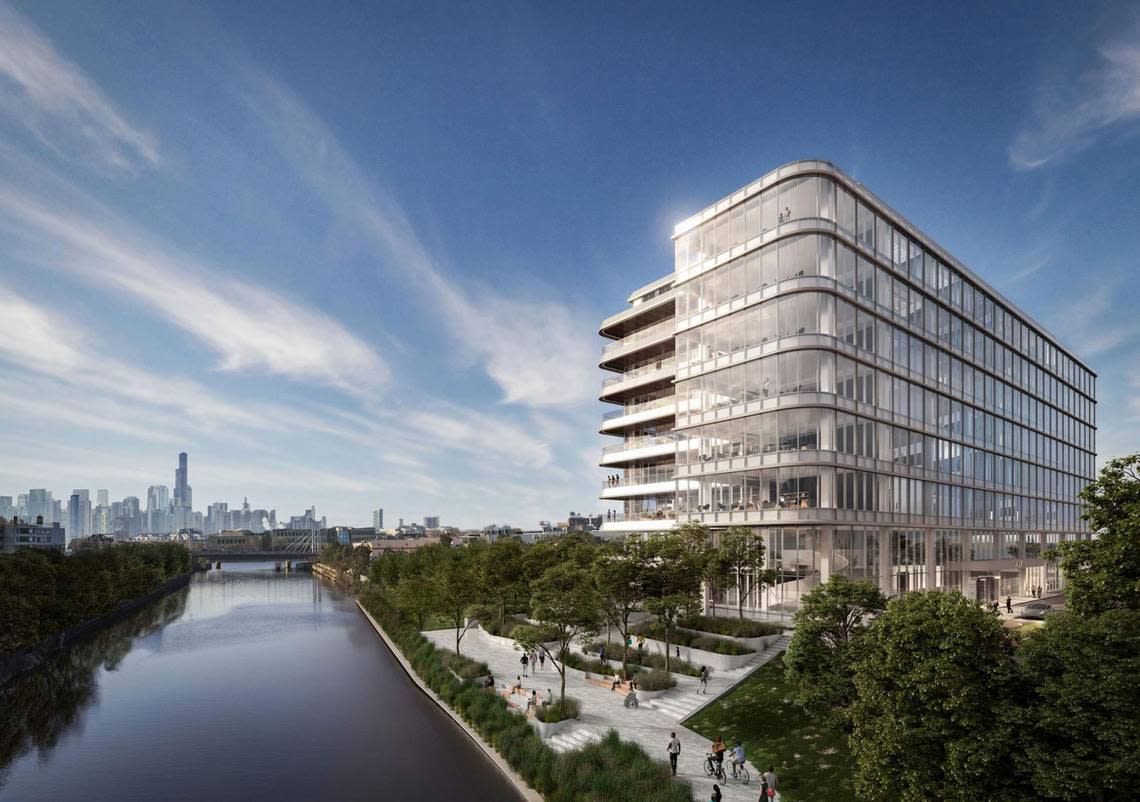Investors pay $62.5 million to turn Durham shopping center into life sciences campus
Developers paid $62.5 million for an aging shopping center just off the Durham Freeway last week and plan to transform the 10-acre site into a “life sciences campus.”
The investment group bought the land just south of N.C. 147 and west of Fayetteville Street. It’s near the Durham Bulls Athletic Park and American Tobacco Campus with a clear view of the ever-rising downtown skyline. The two parcels today are home to Heritage Square and Pelican’s SnoBalls.
No formal plans have been filed with the city, but a spokesperson for Sterling Bay — the Chicago-based development firm at the center of the project — said labs, offices and residential units are all part of the vision.
They declined to answer questions from The N&O about the project and efforts to engage the community.
“We are in the very early stages of the project and are excited about the future of the site and the growth of life sciences in Durham, but do not have more information to share at this point,” the group said through a publicist’s email. “We look forward to getting to work, meeting with local residents and stakeholders, and making progress on programming and design, and we would be happy to circle back when there is more information to share.”
The group said the talent pool fostered by the region’s universities was a big selling point and noted the presence of Google and GlaxoSmithKline.
“Raleigh-Durham is an exciting U.S. growth market with unique character,” Sterling Bay CEO Andy Gloor said in a press release.

Hayti has tangled history
The site is commercially zoned. Its nearest neighbors include a historic Black church whose congregation has worshiped in the area since 1897 and the Durham Freeway, which in the 1960s cut the Hayti community off from downtown and destroyed a once-thriving thriving Black neighborhood.
Julian Pridgen, pastor of St. Mark AME Zion Church, said the church has yet to be contacted by its new neighbors.
“It’s a little bit of a shocker to me,” Pridgen said of the sale. “I hope whatever they do — how do I say it? — I hope they will consider the existing community.”
He’d like the developers to hold meetings and ask for input before they formulate their plans.
“Hear us,” Pridgen said.
Future uncertain for Food World and Pelican’s SnoBalls
Though the property was marketed as “shovel-ready” in a press release JLL Capital markets, which arranged the sale, there are a few business still there, including Durham icons Food World and Pelican’s SnoBalls.
Kwang Lee has owned the international grocery story Food World since 2005.
“Nobody knows,” Lee said when asked what would happen to his business.
It’s one of few grocery stores accessible to residents of Hayti and downtown. Pridgen said he worried about the impact on those who walk to the store.
Food World and a Family Dollar are the only remaining tenants operating in Heritage Square, a one-story shopping center which dates to 1985.
The remaining storefronts are now vacant, the cracked pavement largely empty of cars. A year ago, they housed beauty supply shops, an auto repair center, an outpatient clinic for people struggling with mental health and substance abuse, a flea mall and a Subway sandwich shop.
The properties were sold by LLCs owned by Blake Nucci and Chris Kono. They paid off a $21.5 million loan last year to acquire the land and leases, though Pelican’s SnoBalls still has some rights under a 2020 lease agreement, property records show.
The owner of Pelican’s has not responded to requests for comment.
Who are the investors?
Sterling Bay is a national real estate developer that claims nearly $15 billion worth of assets under management or development. This appears to be its first foray into the North Carolina real estate market.
“We invest in and develop iconic properties,” its website proclaims, the italics its own.
One of its most prominent projects is Lincoln Yards, a massive mixed-use community set to transform a 53-acre swath of industrial land on Chicago’s riverfront — a “city within a city,” the CEO told a local TV station.
The city agreed to chip in up to $1.3 billion for the effort, more than 21% of the total projected $6 billion price tag, the Chicago Tribune reported. The subsidy prompted a lawsuit and a policy change at City Hall, neither of which got in the way of construction workers breaking ground last year.
One of the investors in the Durham project dropped a hint that they may be asking for some public dollars here too.
“Durham is experiencing an influx of leading technology and innovation companies drawn to the area’s highly educated and growing population and proximity to world-class research institutions. As a result, the market attracts substantial public and private funding to support innovation and technological advancements, but the city needs high-end facilities that can meet the demand,” Harrison Street’s senior managing director and head of North American transactions Mark Burkemper said in a news release.

Lincoln Yards includes a life sciences component, eight floors of glass-walled labs on concrete slabs, each with a private balcony. A mini “executive parking” deck will be carved out of the lower level.
The company has a devoted “life sciences” wing, separate from its industrial, residential and retail efforts. It says the practice is led by both healthcare experts and real estate professionals who understand the “exacting environments” clients expect.
Most of Sterling Bays holdings are in the Chicago area, including the Midwest HQ of Google, though it has undertaken projects in Texas, California, Florida, Oregon and Utah.
They’ve partnered with Harrison Street, also headquartered in Chicago, on life sciences projects before. Harrison Street said it’s invested in 8.5 million square feet of lab space globally and is the top owner of life sciences assets in the United Kingdom.
Acram Group, meanwhile, is a New York-based real estate company originally named JMC Holdings. They once owned Raleigh’s Citrix headquarters, buying it for $68.5 million in 2014 before selling it five years later for almost $85 million.
The Durham Report
Calling Bull City readers! We've launched The Durham Report, a free weekly digest of some of the top stories for and about Durham published in The News & Observer and The Herald-Sun. Get your newsletter delivered straight to your inbox every Thursday at 11 a.m. featuring links to stories by our local journalists. Sign up for our newsletter here. For even more Durham-focused news and conversation, join our Facebook group "The Story of my Street."
